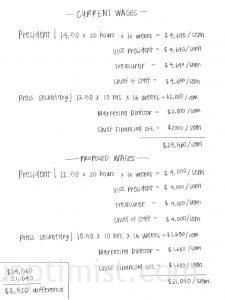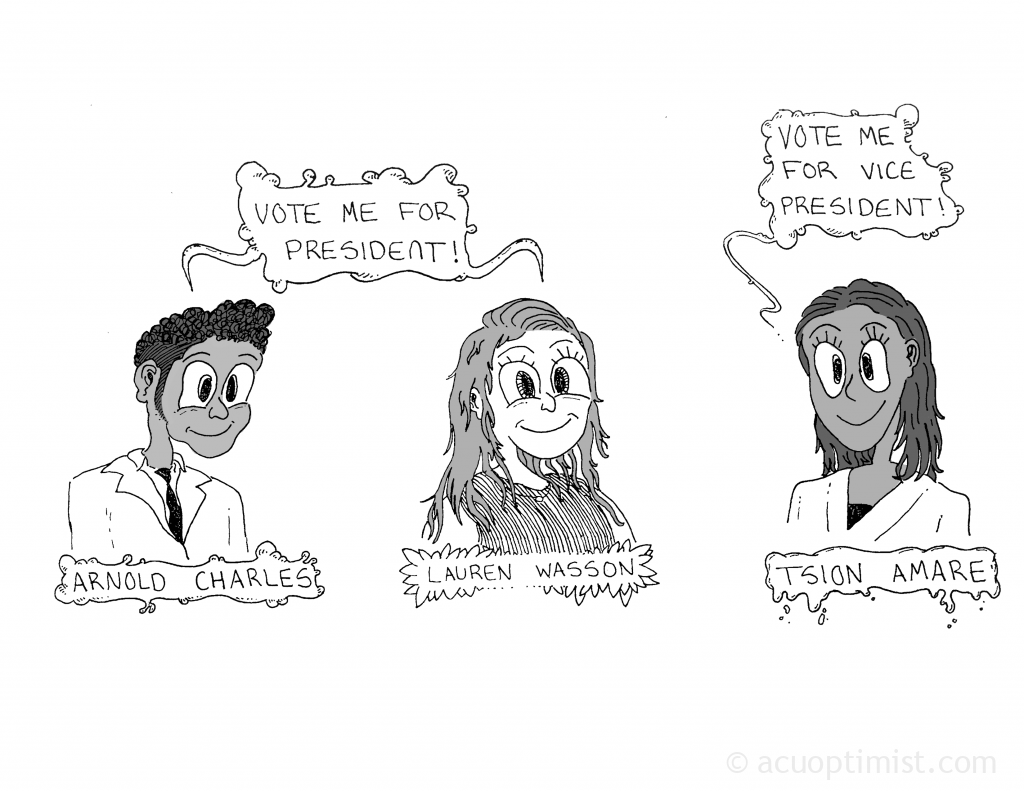Despite vague, unclear platforms and dodging questions in every debate, both Student Government Association executive president candidates focused their priorities on minority representation and mental health.
Lauren Wasson and Arnold Charles struggled to answer debate questions specifically, Wasson answering a question about minority representation by talking about parking, and Charles answering every question with something about minorities on campus, even when it wasn’t relevant.
Unfortunately, the campus needs an executive office with specific goals in mind, not just a generic platform.
Though on paper, Charles might seem like a solid endorsement choice – seven pieces of legislation (one passed) and heavy OMA involvement, the Optimist Editorial Board unanimously believes Wasson is the best candidate for the presidential job.
Wasson, who is running on the same ticket as Tsion Amare for vice president, has six main topics in mind –
- Student wellness program
- Parking
- Mental health awareness
- School spirit and athletic involvement
- Internship housing
- Class projects (specific projects that impact and benefit a students’ respective classification)
The duo spent a lot of time on Monday night’s live debates focusing on parking, explaining that they’re already working with a company called FoPark, an app that shows users in real-time which parking spots in each lot are available. Though this shouldn’t be the face of a campaign, we believe Wasson addressed the topic with just enough weight to know she cares, but has other goals in mind to focus on first.
In addition to parking, the two want to highlight a peer-to-peer mental health program for students to reach each other and start conversations on campus, and more Medical and Counseling Care Center availability. Mental health has become a pressing issue on campus, one that deserves to be the top priority for SGA and administration. Wasson sees this, and desires to implement it through Active Minds, an organization established on 500 college campuses to provide resources and training.
Both candidates addressed Chapel as an issue that needs to be worked on, but Wasson has already worked closely with Cyrus Eaton, chaplain, meeting with him every week. Part of her platform is to include more students actively, advocating for peer stories to be tangible and accessible.
In regard to SGA and Optimist relations, Wasson advocated for weekly meetings with the editor and recognized the importance of collaboration on certain topics. Charles seemed to copy and paste her response when he answered the question in the Wednesday evening debate.

The Editorial Board calculated actual and proposed wages based on information on the SGA website.
Charles, who is running on a single ticket, used his time on both nights to talk about reducing each Executive Cabinet member’s wages by $2, but got his math terribly wrong, offering the student body $8,000 toward a fund for students in financial need. In reality, the reduction would only bring $3,520, though the wages are privately funded by a donor specifically for the purpose of paying the Cabinet.
As an intern for the Office of Multicultural Affairs, Charles strongly advocated for minority representation, as if it was his only platform, though he did not have any specific goals set nor implementation plans.
His lofty goals had no factual reliability, and his explanations were not as well thought out as Wasson’s “Big 6” plan.
Both candidates have prior SGA involvement – Charles as a McKinzie Dorm representative and international student liaison, Wasson as a representative for the College of Arts and Sciences, representative for Dillard Hall and now, executive chief of staff.
Overall, Wasson and Amare have the most tangible goals to reach a majority of students, not just one specific body. The two have built a campaign and platform together, and should be able to see the work they’ve already put in come to fruition next year.
Editors note: All seven members of the Editorial Board voted on the endorsement after watching either the live debate or in-person debate.

